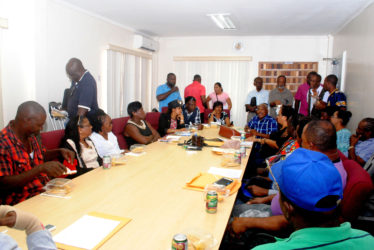When you ask Renwick Solomon what his views are on the emergence of mining syndicates as a departure from the traditional types of operations that characterizes Guyana’s gold-mining industry he recommends that you talk with the hundreds of other small miners who behave as though they have been given a new lease on their economic lives following the advent of what he loosely calls “mining cooperatives.”
Solomon himself has been involved in gold mining “intermittently” since 2004. Prior to being in mining he worked as a Field Officer with the Guyana Geology and Mines Commission.
He is unequivocal about the transformation which he believes will come about in the mining sector as a result of the advent of syndicates. “It will pose a serious challenge to landlordism.” That is his first observation. Solomon says that in its crudest form landlordism is about the abuse of small miners who are allowed by the big players to “work” modest areas on huge claims, which the big players control, only for as long as the gold yield is decidedly modest. “Bore real gold” and the tenant is evicted with undue haste, he says.

Solomon, who has himself been a victim of eviction, says it is a devastating experience. “You are dislocated. You have to make arrangements to relocate, if you can, or else you have to park your equipment,” Solomon says.
He believes that syndicates will radically alter the fortunes of the people he call “the real small miners.” They are not an inconsequential group. Among them, they own around 5,000 dredges, many of these are parked. The owners have no land to work. He does a quick multiplication of the number of small miners ‘times’ their other family members to communicate the number of people who are likely to be affected by the advent of syndicates.
He turns to the theme of the concerns expressed by the Guyana Gold and Diamond Miners Association theory about an official conspiracy to divide the miners. The established miners, the big players, as he calls them, have never really had a great deal in common with the small miners, save and except the landlord/tenant relationship. “The small miners with no land of their own have always been helpless,” he says.
Solomon explains that the circumstances in the gold mining industry were such that frequently there were no formal agreements between the landlords and the tenants. “Even in cases where agreements might have existed it has been relatively easy to have the small miners removed,” Solomon says, adding that such removal frequently occurred through the use of force.
Minister in the Ministry of Natural Resources Simona Broomes, who has been spearheading the syndicate initiative, has repeatedly said that its significance reposes in its potential to transform the lives of hundreds of small miners and their families. Broomes told Stabroek Business on Wednesday, “You have to understand what landless small miners have to go through to grasp the real significance of the initiative. Once this gets off the ground it will transform the gold mining industry and give the small miners a fair break.”

And Solomon says he believes the advent of syndicates had become necessary as a result of the transformed climate in the gold-mining sector. “Not so long along ago what obtained was a brother’s keeper, an environment of camaraderie in the gold mining sector. You could look to a fellow miner for support in all sorts of ways. I believed that all of that changed some years ago with the increase in the price of gold. After the prices went up a new breed of people with huge amounts of capital came into the sector. Rich people prospered, camaraderie was lost; selfishness took over,” he says.
Solomon frowns on what he says is the dismissiveness with which small operators in the sector are treated. He says that contrary to the view that is often peddled, small gold mining operations are structured operations. “We run our operations like structured businesses in the same way that bigger operations do,” he says. “Every dredge has its assigned number of persons performing their various functions. It is not a perfect system but that applies to the bigger operations as well.”
Solomon says that the advent of syndicates could have a positive effect on gold production and on business in the country as a whole. He lists aviation, ground and river transportation, the agricultural sector, and the dairy industry as sectors that are likely to experience growth once the syndicates are “up and running.”
Solomon is Chairman of the recently created Fourteen Miles, Issano Syndicate, a responsibility which he says he takes seriously. “We believe that we can set an example that could change the dynamic of the industry. As far as living within the laws are concerned we are going to have to help each other. Tax compliance is critical and I expect that we will have to recruit accountants and various other professionals to ensure that we are compliant with the law. There are also issues to do with safety and health and we must also seek to run operations to ensure that the operations of the members of the syndicate are reasonably viable.” Solomon hopes, too, that the advent of syndicates might reintroduce what he calls “the brother’s keeper culture” in the industry. “I expect that we are just going to have to help each other,” Solomon says.
He says he doubts the recent vigorous public statement by the GGDMA can douse the enthusiasm of the small miners who regard the advent of syndicates as a ‘godsend.’ He rejects the very idea that the syndicate initiative is some kind of political Trojan horse and says he believes that the fact that the GGDMA has offered the syndicates its best wishes is a good sign. “After all, we are all working towards bettering ourselves and making a difference to the country’s economy,” he says.




